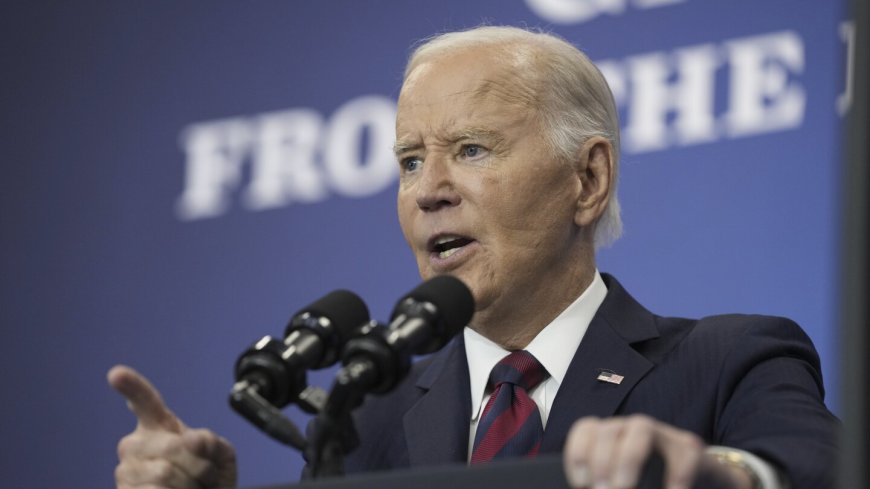Biden approves national security memo on China, Iran, North Korea and Russia ahead of Trump's return
WASHINGTON (AP) — President Joe Biden has approved a new national security memorandum ahead of Donald Trump's return to the White House that could serve as a road map for the incoming administration as it looks to counter growing cooperation among China, Iran, North Korea and Russia, the White House said Wednesday.Biden administration officials began developing the guidance this summer. It was shaped to be a document that could help the next administration build its approach from Day 1 on how it deals with the tightening relationships involving America's most prominent adversaries and competitors, according to two senior administration officials.The officials, who spoke on the condition of anonymity under ground rules set by the White House, said the classified memorandum would not be made public because of the sensitivity of some of its findings. The document includes four broad recommendations: improving U.S. government interagency cooperation, speeding up the sharing of information with allies about the four adversaries, calibrating the U.S. government's use of sanctions and other economic tools for maximum effectiveness, and bolstering preparation to manage simultaneous crises involving the adversaries.Hub peek embed (Iran) - Compressed layout (automatic embed) The U.S. for many years has been concerned about cooperation among the four countries. Coordination has accelerated between the countries in the aftermath of Russia's invasion of Ukraine in 2022.The officials noted that as Russia has become more isolated by much of the world, Moscow has turned to Iran for drones and missiles. From North Korea, the Russians have received artillery, missiles and even thousands of troops that have traveled to help the Russians try to repel Ukrainian forces from the Kursk region. China, meanwhile, has supported Russia with dual use components that help keep its military industrial base afloat. In return, Russia has sent fighter jets to Iran and assisted Tehran as it looks to bolster its missile defense and space technology. North Korea has received from Russia much-needed fuel and funding to help build out its manufacturing and military capabilities. The officials added that Russia has “de facto accepted North Korea as a nuclear weapon state.”China, meanwhile, is benefiting from Russian know-how, with the two countries working together to deepen their military technical cooperation. The two nations are also conducting joint patrols in the Arctic region.Biden and Trump have sharply different worldviews, but officials in both the incoming and outgoing administrations said they have sought to coordinate on national security issues during the transition.One of the officials said that the Biden White House memo “isn’t trying to box (the Trump administration) in or tilt them toward one policy option or another.”The official said the document is intended to help the next administration build “capacity” as it shapes its policies on some the most difficult foreign policies it will face.

WASHINGTON (AP) — President Joe Biden has approved a new national security memorandum ahead of Donald Trump's return to the White House that could serve as a road map for the incoming administration as it looks to counter growing cooperation among China, Iran, North Korea and Russia, the White House said Wednesday.
Biden administration officials began developing the guidance this summer. It was shaped to be a document that could help the next administration build its approach from Day 1 on how it deals with the tightening relationships involving America's most prominent adversaries and competitors, according to two senior administration officials.
The officials, who spoke on the condition of anonymity under ground rules set by the White House, said the classified memorandum would not be made public because of the sensitivity of some of its findings.
The document includes four broad recommendations: improving U.S. government interagency cooperation, speeding up the sharing of information with allies about the four adversaries, calibrating the U.S. government's use of sanctions and other economic tools for maximum effectiveness, and bolstering preparation to manage simultaneous crises involving the adversaries.
The U.S. for many years has been concerned about cooperation among the four countries. Coordination has accelerated between the countries in the aftermath of Russia's invasion of Ukraine in 2022.
The officials noted that as Russia has become more isolated by much of the world, Moscow has turned to Iran for drones and missiles. From North Korea, the Russians have received artillery, missiles and even thousands of troops that have traveled to help the Russians try to repel Ukrainian forces from the Kursk region. China, meanwhile, has supported Russia with dual use components that help keep its military industrial base afloat.
In return, Russia has sent fighter jets to Iran and assisted Tehran as it looks to bolster its missile defense and space technology.
North Korea has received from Russia much-needed fuel and funding to help build out its manufacturing and military capabilities. The officials added that Russia has “de facto accepted North Korea as a nuclear weapon state.”
China, meanwhile, is benefiting from Russian know-how, with the two countries working together to deepen their military technical cooperation. The two nations are also conducting joint patrols in the Arctic region.
Biden and Trump have sharply different worldviews, but officials in both the incoming and outgoing administrations said they have sought to coordinate on national security issues during the transition.
One of the officials said that the Biden White House memo “isn’t trying to box (the Trump administration) in or tilt them toward one policy option or another.”
The official said the document is intended to help the next administration build “capacity” as it shapes its policies on some the most difficult foreign policies it will face.


























































